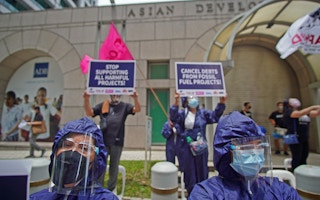Climate campaigners intensified their push for the Asian Development Bank (ADB) to withdraw all fossil fuel projects from its proposed energy policy, barely two months away from key United Nations climate talks.
To continue reading, subscribe to Eco‑Business.
There's something for everyone. We offer a range of subscription plans.
- Access our stories and receive our Insights Weekly newsletter with the free EB Member plan.
- Unlock unlimited access to our content and archive with EB Circle.
- Publish your content with EB Premium.
After a year’s delay, the 26th Conference of Parties (COP26) is due to take place from 31 October to 12 November in Scotland, amid increasing pressure to slash carbon emissions after the Intergovernmental Panel on Climate Change (IPCC)’s report in August, warned that the world is expected to get warmer much faster than previously expected without drastic moves to cut greenhouse gas pollution.
“Unless the ADB board and management substantially recalibrate their draft energy policy, they can expect to continue to face heightened concerns from community groups, social movements and national civil society alliances across the region during COP26 and beyond,” said Tanya Lee Roberts-Davis, energy policy and campaigns strategist of NGO Forum on ADB, a network of civil society organisations that monitors the ADB and other development banks.
Speaking to Eco-Business, Davis said enabling finance for new oil and gas developments while offering support to large hydro, waste incinerators and large-scale biomass burning leaves the ADB “standing in the way of what the climate science demands, while undermining forward-looking agendas for inclusive, sustainable just transitions.”
“
Unless the ADB board and management substantially recalibrate their draft energy policy, they can expect to continue to face heightened concerns from community groups, social movements and national civil society alliances across the region during COP26 and beyond.
Tanya Lee Roberts-Davis, energy policy and campaigns strategist, NGO Forum on ADB
The Asian Peoples Movement on Debt and Development (APMDD), a regional alliance of 50 member organisations and movements, echoed how the ADB should review its energy draft policy in time for the climate conference.
“The ADB must not miss the chance to make the right decisions when the finalised version is expected to be submitted to its board of directors for formal consideration in its October meeting before COP26. It will be a crucial reckoning whether governments and their financial institutions are bringing us closer to solving climate change or are actually endangering our chances further,” said Lidy Nacpil, APMDD coordinator.
Avril de Torres, environmental and energy lawyer of non-government research institute Centre for Energy, Ecology and Development (CEED) said that if ADB revises its energy policy before COP26, it will be sending a “signal to its member countries that it is ready to support even more ambitious sustainable energy goals in their nationally determined contributions (NDCs)”.
The NDCs are legally binding climate targets that countries submit to the United Nations in line with the Paris Agreement.
ADB released in May a draft energy policy document for public consultation that stated it will end all financing for coal mining and any new coal-fired capacity. But civil society groups decried the proposed draft which referred to gas as a “transitional” fuel and provided few details about its funding plans that could allow for US$3 billion of gas investment to continue.
Green groups said they were hopeful that the bank would listen to their feedback and eliminate support for all new oil and gas developments in the working paper, released on 17 August, but said that gaps remain in the updated version of the policy draft.
Lack of inclusion and questionable wordings
The ADB’s working paper was “hastily rushed” to the board of directors for approval with only a two-week window (16 to 31 August) for public review and input. Non-English speaking communities with little or no access to the internet—the very people who are impacted by the ADB’s projects—were effectively excluded, noted Vidya Dinker, president of non-profit Indian Social Forum.
“We were surpised that it came out only in English. Most communities in Asia and the Pacific struggle a little with that language. If what ADB said was true that it was rolling out policies to have meanful consultation with stakeholders that they are engaged in, we would expect policies in the major Asian languages at least, or in braille,” said Dinker in a virtual press conference on Thursday.
The working paper also dropped the word “rapid” in referring to coal phase-out and instead uses the terms “phase-out of coal” and “gradual phase-out of fossil fuels,” APMDD’s Nacpil pointed out.
“We urge ADB to reinstate the word ‘rapid’ in referring to coal phase-out in the policy document. Given the new dire warnings of the intensification of climate change and the escalation of its impacts which the latest IPCC report emphasises, and given that renewable energy alternatives are already feasible and cheaper, there is no more time and no reason to delay the phase-out of coal and other fossil fuels,” she said.










